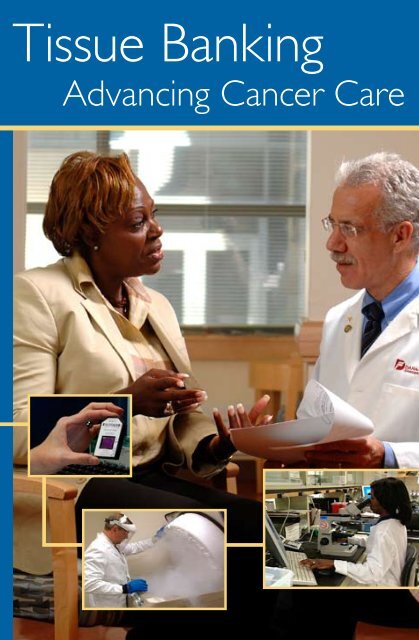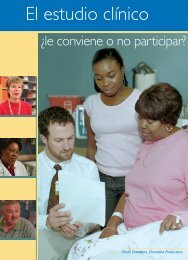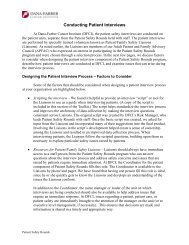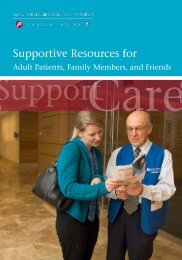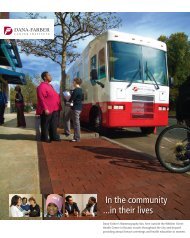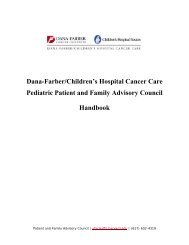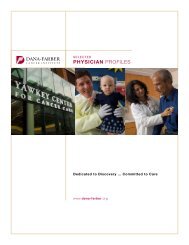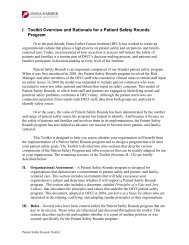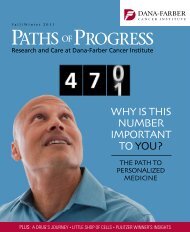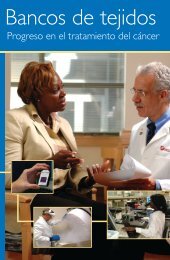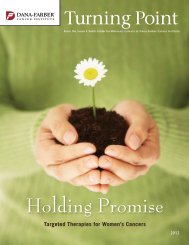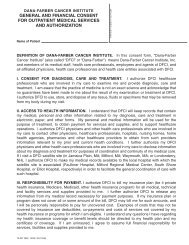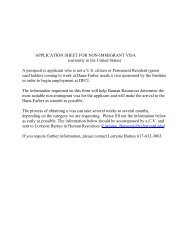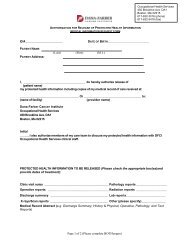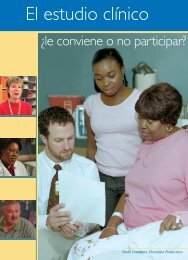tissue-banking booklet - Dana-Farber Cancer Institute
tissue-banking booklet - Dana-Farber Cancer Institute
tissue-banking booklet - Dana-Farber Cancer Institute
Create successful ePaper yourself
Turn your PDF publications into a flip-book with our unique Google optimized e-Paper software.
Tissue BankingAdvancing <strong>Cancer</strong> Care
AcknowledgmentsProducerDirectorWriterPhotographerDesignerChristina M. Parker, MD<strong>Dana</strong>-<strong>Farber</strong> <strong>Cancer</strong> <strong>Institute</strong>, Inc.David H. RosePOV-Rose FilmsLonnie K. ChristiansenKeller Medical CommunicationsSam OgdenAdam Gerberick<strong>Dana</strong>-<strong>Farber</strong>/Harvard <strong>Cancer</strong> CenterHealth Communications Core
About This ProgramThis audiovisual program and <strong>booklet</strong>were produced by <strong>Dana</strong>-<strong>Farber</strong> <strong>Cancer</strong> <strong>Institute</strong> incollaboration with Brigham and Women’s Hospital,Massachusetts General Hospital, and the Beth IsraelDeaconess Medical Center. They are for use by the<strong>Dana</strong>-<strong>Farber</strong>/Harvard <strong>Cancer</strong> Center and other institutionsthat provide information about <strong>tissue</strong> <strong>banking</strong>.Funding for the production of this program wasprovided by the National <strong>Institute</strong>s of Health (NIH)Human Subjects Research Enhancements Program.We thank the patients, family members, and hospitalstaff members who generously volunteered theirtime to participate in this program. They describedunique experiences in their own words, and theirinsights provided the core of the program. We alsothank the Patient and Family Advisory Council of<strong>Dana</strong>-<strong>Farber</strong> <strong>Cancer</strong> <strong>Institute</strong>, who offered criticalsuggestions throughout the production process.We dedicate this program and <strong>booklet</strong> to the patientswho have donated <strong>tissue</strong> for medical research.
4TISSUE BANKINGOur GoalThis program was created to explain what<strong>tissue</strong> <strong>banking</strong> is, why it is so important, and whobenefits from it. Our goal is to provide information thatmight help you decide whether or not to donate your<strong>tissue</strong> for medical research. The <strong>booklet</strong> reviews keyinformation from the program and answers additionalquestions you might want to ask.We hope that this information is useful as you considerwhether or not to participate in <strong>tissue</strong> <strong>banking</strong>. This<strong>booklet</strong> is not intended as a substitute for discussionsbetween you and your physician or health careprovider.
ADVANCING CANCER CARE 5Table of Contents6 WHAT IS TISSUE BANKING?8 WILL DONATING MY TISSUE CHANGE MYSURGERY OR CARE?9 WHO BENEFITS FROM TISSUE BANKING?11 HOW MUCH PERSONAL AND MEDICALINFORMATION SHOULD I SHARE?12 HOW WILL MY PRIVACY BE PROTECTED?14 OTHER QUESTIONS YOU MIGHT WANT TO ASK14 What are the financial implications of <strong>tissue</strong>donation?14 What if I change my mind after donating <strong>tissue</strong>?15 Will I get the results of research using my <strong>tissue</strong>?15 Will research results be shared with my employeror health insurance provider?15 Will research using my donated <strong>tissue</strong> contributeto my medical care?16 How do I decide whether or not to donate <strong>tissue</strong>?17 TO LEARN MORE
6TISSUE BANKINGWhat Is Tissue Banking?Tissue <strong>banking</strong> is storing leftover human<strong>tissue</strong> that has been removed during a medicalprocedure such as an operation, a biopsy, or a bloodtest. This extra <strong>tissue</strong> is not needed for your diagnosisor treatment. With your written consent, this<strong>tissue</strong> is sent to a <strong>tissue</strong> bank, where it is carefullypreserved and protected. Scientists use <strong>tissue</strong>s fromthese banks to study disease and find better waysto diagnose, prevent, and treat cancer in the future.Tissue donated for medical research is not used ineither organ transplantation or blood transfusions.Human <strong>tissue</strong> donated for medical research caninclude:• Pieces of tumor from the lung, breast, kidneys,or other organs• <strong>Cancer</strong>ous cells from blood and bone marrow• Excess normal <strong>tissue</strong> from organs or blood• Other fluids from the body
ADVANCING CANCER CARE 7Tissue <strong>banking</strong> helps scientists better understandwhat causes cancer, which treatment options arelikely to be effective, and how to improve patientcare in the years to come.“Tumor <strong>banking</strong> is what will take us to the next level of cancertreatment and cure.”—JUDY GARBER, MD, MPH, PHYSICIAN
8TISSUE BANKINGWill Donating My TissueChange My Surgery or Care?Patients sometimes ask if their decision todonate <strong>tissue</strong> will affect their treatment. The answeris no. Regardless of whether you decide to donateyour <strong>tissue</strong> or not, your operation and medical carewill be exactly the same. Your decision will not affecthow much <strong>tissue</strong> is removed during surgery, and itwill not change the number of visits to your doctor.Patients who are thinking of donating <strong>tissue</strong>may also be concerned that the doctor will not haveenough <strong>tissue</strong> for their diagnosis and treatment.That never happens. During your medical procedure,your doctor will remove all the <strong>tissue</strong> needed fora thorough diagnosis and treatment. A portion ofyour <strong>tissue</strong> is not neededfor your cancer care. Thisleftover <strong>tissue</strong>, which wouldotherwise be discarded, issent to the <strong>tissue</strong> bank.“We make sure that we have enough <strong>tissue</strong> to tell us all the informationthat we need to take care of you, the patient, prior to donating some<strong>tissue</strong> to a <strong>tissue</strong> bank.”—Lawrence N. Shulman, MD, physician
ADVANCING CANCER CARE 9Who Benefits From TissueBanking?If you donate your <strong>tissue</strong> for research,you probably will not benefit directly, but others willbenefit in the future. Tissue <strong>banking</strong> helps scientistsstudy the biology of cancer. It helps them answerimportant questions about why cancer develops, howit grows, and who is at risk. The answers to thesequestions can lead to earlier, more accurate diagnosisand better treatment. But it takes a long time forscientists to make discoveries from medical research.Just as the discoveries of a decade ago led to currenttherapies, the knowledge gained from studying human<strong>tissue</strong> today will advance patient care in the yearsahead. When you donate your <strong>tissue</strong> for research, youare helping the generation of cancer patients to come.Many different types of research rely on the useof human <strong>tissue</strong>:• Learning how cancer cells work• Identifying the causes of cancer• Understanding how cancer behaves in differentethnic groups• Developing new cancer drugs and diagnostic tests• Discovering “markers” that predict who willrespond to treatment
10TISSUE BANKINGFor example, by studying thousands of breast tumors,researchers discovered that about 25% carry extracopies of a gene called HER2. This type of breastcancer is known as HER2-positive, and it behavesdifferently than other breast cancers. After analyzingHER2-positive tumors, scientists were able to developdiagnostic tests, which are now commonly used tofind out whether a breast tumor is HER2-positiveor not. Knowledge of HER2-positive tumors alsoenabled scientists to design a drug that slows thegrowth of tumors and improves survival outcomesfor these patients.“I feel wholeheartedly that I was able to contribute to someonebeing healed, or cured, or treated.”—Brenda, patient
ADVANCING CANCER CARE 11How Much Personal and MedicalInformation Should I Share?It is your choice whether or not to donateyour <strong>tissue</strong> to a <strong>tissue</strong> bank. You also have a choiceas to how much or how little information you wantto share. For example, you can consent just to havingyour <strong>tissue</strong> collected. Or you can consent to sharingsome personal information such as your gender, age,racial or ethnic group, and history of smoking. Youcan also allow access to your medical record. Thechoice is yours.Knowing a patient’s age and ethnic group mayhelp researchers understand how these factors affectthe risk of getting cancer. And being able to studypatients’ <strong>tissue</strong>s in light of their medical historiesmay tell scientists a lot moreabout the causes of cancer andhow to develop new therapies.“It adds enormous value to the banked <strong>tissue</strong> if it is linked to someclinical information. You might say, ‘You can have my <strong>tissue</strong>, youcan have access to my medical record, and you can phone meup in 10 years to see how I’m doing.’ Or you can just say no. It’scompletely voluntary.”—Christopher Fletcher, MD, PATHOLOGIST
12TISSUE BANKINGHow Will My Privacy BeProtected?Federal laws and regulations protect theprivacy and confidentiality of your medical information.The administrator of the <strong>tissue</strong> bank must submit aplan explaining how your private information will beprotected. A committee at your hospital, known asthe Institutional Review Board, or IRB, will reviewthe plan to make sure that it strictly follows theselaws and regulations.The plan must explain what information will bestored in the bank and how it will be kept confidential,how <strong>tissue</strong>s will becollected and linked toconfidential information,and how the bank willprevent unauthor izedaccess to its computerfiles. So the risk of yourprivacy being violated isvery small.“There’s always a finite risk that information will get disclosed. But the benefitof being able to connect her type of tumor with the type of treatment that’ssuccessful not only benefits her, if she has a recurrence, but all those otherpeople down the road.”—Robin, parent of pediatric patient
ADVANCING CANCER CARE 13The IRB must also review the plan if the <strong>tissue</strong> bankintends to send <strong>tissue</strong> samples to other researchersfor study. Before sending out your <strong>tissue</strong> sample, the<strong>tissue</strong> bank will code it with a number instead of yourname and take out all identifying information, suchas your name, address, phone number, and SocialSecurity number. The <strong>tissue</strong> bank will include onlythe information that is needed for the researcher toperform the study.Before <strong>tissue</strong> banks and other researchers can useyour <strong>tissue</strong> for study, they must obtain your writtenconsent. This informed consent form explains:• How your <strong>tissue</strong> will be collected and used inresearch• How your medical information will be stored• What information will be provided toresearchers• How to contact the <strong>tissue</strong> bank administratorif you would like to withdraw your consent forfuture researchBy signing the informed consent form, you indicatethat you understand the information explained toyou and are willing to donate <strong>tissue</strong> for researchpurposes.
14TISSUE BANKINGOther Questions You MightWant to AskWhat are the financial implications of<strong>tissue</strong> donation?There is no charge to you or to your insurance companyfor donating your <strong>tissue</strong>. At the same time, youwill not be paid a fee for your <strong>tissue</strong> or for any of thediscoveries that might result from research usingyour <strong>tissue</strong>.What if I change my mind afterdonating <strong>tissue</strong>?You can change your mind at any time about allowingyour <strong>tissue</strong> to be used in future research. The consentform explains how to contact the <strong>tissue</strong> bank. Ifyou wish to withdraw your consent for all researchor change the amount of personal information youare willing to share, tell the administrator. If someof your <strong>tissue</strong> has already been sent out, however,the <strong>tissue</strong> bank cannot get it back, and you cannotwithdraw your permission for the research done onthose particular <strong>tissue</strong> samples.
ADVANCING CANCER CARE 15Will I get the results of research usingmy <strong>tissue</strong>?Tissue banks and other researchers will not reportto you the results of any research using your donated<strong>tissue</strong>. Research studies take many years and require<strong>tissue</strong> samples from hundreds or thousands of people.The results are published in scientific journals.Will research results be shared with myemployer or health insurance provider?Results of research using your <strong>tissue</strong> will not be put inyour medical record and will not be released to youremployer, health insurance provider, or anyone else.Will research using my donated <strong>tissue</strong>contribute to my medical care?The results of research using <strong>tissue</strong> samples will notaffect your care right now. If your cancer comes backin the future, however, new treatment options maybe available.
16TISSUE BANKINGHow do I decide whether or not todonate <strong>tissue</strong>?Talk it over with your doctor or nurse. Or discussthis <strong>booklet</strong> with your family and friends. Foradditional information, see the resources listed onthe following page.
ADVANCING CANCER CARE 17To Learn MoreFor additional information about <strong>tissue</strong> <strong>banking</strong>National <strong>Cancer</strong> <strong>Institute</strong> (NCI)http://www.cancer.gov/clinicaltrials/resources/providing<strong>tissue</strong>http://biospecimens.cancer.gov/basics/BioBankCentralemail: info@biobankcentral.orghttp://www.biobankcentral.org/index.phpTo view this program using the Internethttp://www.dana-farber.org/<strong>tissue</strong>_<strong>banking</strong>To request a copy of this program<strong>Dana</strong>-<strong>Farber</strong>/Harvard <strong>Cancer</strong> CenterOffice for the Protection of Research Subjects<strong>Dana</strong>-<strong>Farber</strong> <strong>Cancer</strong> <strong>Institute</strong>44 Binney StreetBoston, MA 021151 (617) 632-3029email: oprs@dfci.harvard.eduhttp://www.dana-farber.org/<strong>tissue</strong>_<strong>banking</strong>
18TISSUE BANKINGMy Questions_____________________________________________________________________________________________________________________________________________________________________________________________________________________________________________________________________________________________________________________________________________________________________________________________________________________________________________________________________________________________________________________________________________________________________________________________________________________________________________________________________________________________________________________________________________________________________________________________________________________________________________________________________________________________________________________________________________________________________________________________________________________________________________________________________________________
Tissue BankingAdvancing <strong>Cancer</strong> Care
Tissue BankingAdvancing <strong>Cancer</strong> CareApproved by:Patient Family Education Council<strong>Dana</strong>-<strong>Farber</strong> <strong>Cancer</strong> <strong>Institute</strong>September 2007©2007 <strong>Dana</strong>-<strong>Farber</strong> <strong>Cancer</strong> <strong>Institute</strong>, Inc.All Rights Reserved


